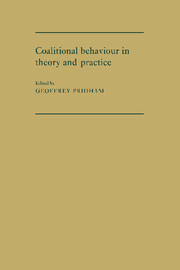Book contents
- Frontmatter
- Contents
- List of illustrations
- List of tables
- Notes on the contributors
- Preface
- 1 An inductive theoretical framework for coalitional behaviour: political parties in multi-dimensional perspective in Western Europe
- 2 Between theoretical elegance and political reality: deductive models and cabinet coalitions in Europe
- 3 Changing coalitional preferences among West German parties
- 4 The FDP and coalitional behaviour in the Federal Republic of Germany: multi-dimensional perspectives on the role of a pivotal party
- 5 Cabinet stability in the French Fourth Republic: the Ramadier coalition government of 1947
- 6 Coalition formation and maintenance in Belgium: a case-study of elite behaviour and changing cleavage structure, 1965–1981
- 7 The Dutch Christian Democratic party and coalitional behaviour in the Netherlands: a pivotal party in the face of depillarisation
- 8 Coalition or Fianna Fail? The politics of inter-party government in Ireland
- 9 Italy's party democracy and coalitional behaviour: a case-study in multi-dimensionality
- 10 Party coalitions in the first democratic period in Spain, 1977–1982
- 11 Coalitional theory and practice in Scandinavia
- 12 Multi-dimensional approaches to the study of local coalitions: some cross-national comparisons
- 13 Research notes
- Index
Preface
Published online by Cambridge University Press: 05 November 2011
- Frontmatter
- Contents
- List of illustrations
- List of tables
- Notes on the contributors
- Preface
- 1 An inductive theoretical framework for coalitional behaviour: political parties in multi-dimensional perspective in Western Europe
- 2 Between theoretical elegance and political reality: deductive models and cabinet coalitions in Europe
- 3 Changing coalitional preferences among West German parties
- 4 The FDP and coalitional behaviour in the Federal Republic of Germany: multi-dimensional perspectives on the role of a pivotal party
- 5 Cabinet stability in the French Fourth Republic: the Ramadier coalition government of 1947
- 6 Coalition formation and maintenance in Belgium: a case-study of elite behaviour and changing cleavage structure, 1965–1981
- 7 The Dutch Christian Democratic party and coalitional behaviour in the Netherlands: a pivotal party in the face of depillarisation
- 8 Coalition or Fianna Fail? The politics of inter-party government in Ireland
- 9 Italy's party democracy and coalitional behaviour: a case-study in multi-dimensionality
- 10 Party coalitions in the first democratic period in Spain, 1977–1982
- 11 Coalitional theory and practice in Scandinavia
- 12 Multi-dimensional approaches to the study of local coalitions: some cross-national comparisons
- 13 Research notes
- Index
Summary
This volume is the outcome of the workshop on ‘Political Parties and Coalitional Behaviour in Western Europe’ held during the sessions of the European Consortium for Political Research (ECPR) at Salzburg in April 1984. More longterm, the idea for the workshop originated in the approach being developed for my own work on Italy and in an interest in testing this cross-nationally. The detailed framework included as an appendix to the first chapter specifies the various concepts and hypotheses that have influenced this approach; and it is the seven dimensions itemised in this framework that have acted as guidelines in revising the contributions to this book.
In carrying through this project, the principal intention has not been to present only another study of coalitions in Western Europe but rather to attempt something more ambitious by taking a fresh look at coalition theory in the light of coalition experience, and using this multi-dimensional framework as applied to the West European area for interpreting the dynamics of coalitional behaviour as a whole. Inevitably, in view of the – now more recognised – complexities of the subject, such an approach has to be inductive in its methodological design. While traditional coalition theories, first and foremost deductive or formal in style, have been important in pioneering work in this field and are still relevant, particularly in evaluating motivation in coalition formation, they have increasingly been found insufficient for handling these complexities.
- Type
- Chapter
- Information
- Coalitional Behaviour in Theory and PracticeAn Inductive Model for Western Europe, pp. xvii - xxPublisher: Cambridge University PressPrint publication year: 1986

